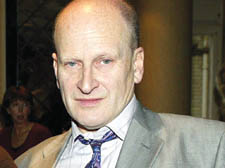|
|
 |
| |

Nicholas de Jongh |
Critic Nicholas de Jongh takes to the stage
AS the shadow precedes Nosferatu, Nicholas de Jongh’s reputation goes before him.
The Evening Standard’s long-established theatre critic, who lives in Barnsbury, has made a name as a biting, mercurial commentator on the London stage; the playwright John Osborne barred de Jongh from his funeral and Steven Berkoff threatened to kill him after an unfavourable review.
Contrary to all expectations, de Jongh in person – pale and fey in a grey pin-stripe suit – is charm personified. Nice, even. This may have something to do with timing: his play, Plague Over England, about the homosexual witch-hunts in 1950s Britain, opens in the West End this week and de Jongh doesn’t want to make any new enemies among his fellow critics just now.
“Being a theatre critic perhaps I do take the reviews seriously, from some people,” he says. “I worked at it very much as a critic. I’m bored at the theatre so often by people who waste words.”
At the fringe opening, he says, “my colleagues were terrific in their support. Beyond that, I was aware of quite a lot of hostility as well, to the idea of a critic presuming or daring to enter the hallowed portals of theatrical authorship.”
The other great hurdle in the theatre was – and still is – sexuality, according to de Jongh. Sir John Gielgud, the subject of his play, looked set to lose his career when he was arrested in a Chelsea public lavatory in 1953 and charged with “persistently importuning men for immoral purposes”.
“The heavens rained down fury on him,” says de Jongh. “All the suppressed puritan rage and latent homosexuality disguised as disgusted assertions of normality were his. I always felt what happened to him was a lasting source of shame and stigma. There were a lot of people whose lives were probably ruined by the times and attitudes. It was a London terrorism, a climate of fear.
“Young people have forgotten this. For them it’s a lost England. I wrote this play for them. It was Gielgud’s offence which precipitated a public discussion. But homophobia is not altogether passed. It has shifted. It’s far worse now in terms of incidents reported, attacks on gay men and bullying at school. Homo-visibility has led to homophobia.”
“The theatre world is very homophobic. How many actors come out? Who would you point to apart from the bronze trinity of McKellen, Sher and Callow? I don’t say they’ve got to come out, but it’s a sign that it’s commercially unwise to do so. I may be the only critic who is open and unapologetic about being gay.”
De Jongh is less open about his private life: he will not reveal his age, discuss his love affairs or talk about his childhood. All he will say is that his mother trained to be a professional musician but was stymied by her nerves, and his father was a Hampstead GP.
He suggests he might be ready to leave the world of critics behind but will not be drawn on future plans; and of his reputation he is quietly diffident. “I don’t think I’m that much more difficult to please. I can only attribute it to how I put in the knife, not that I put in the knife. I’m still waiting for benevolence – I don’t know whether it will turn up.”
Simon Wroe
• |

|
 |
|
 |
|

